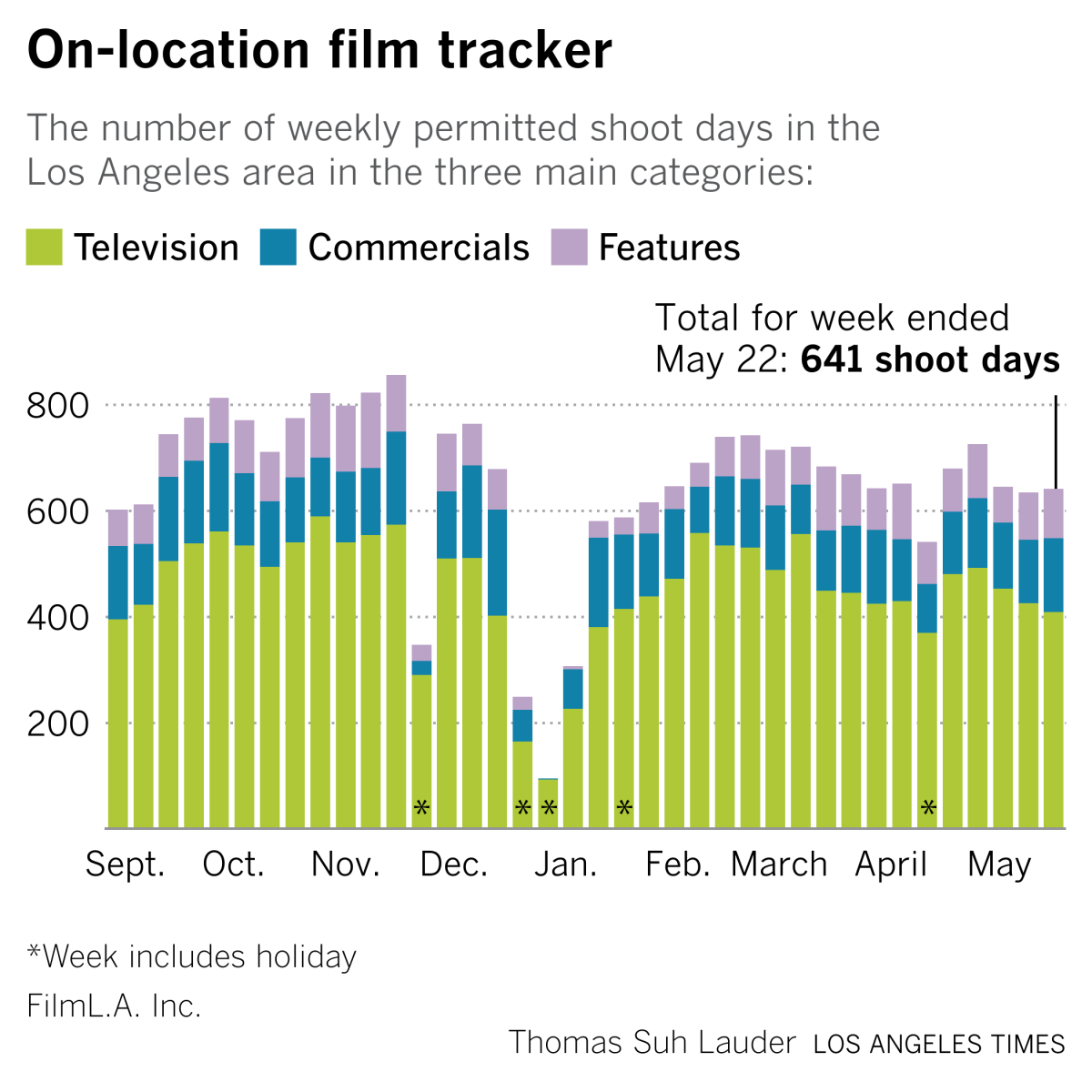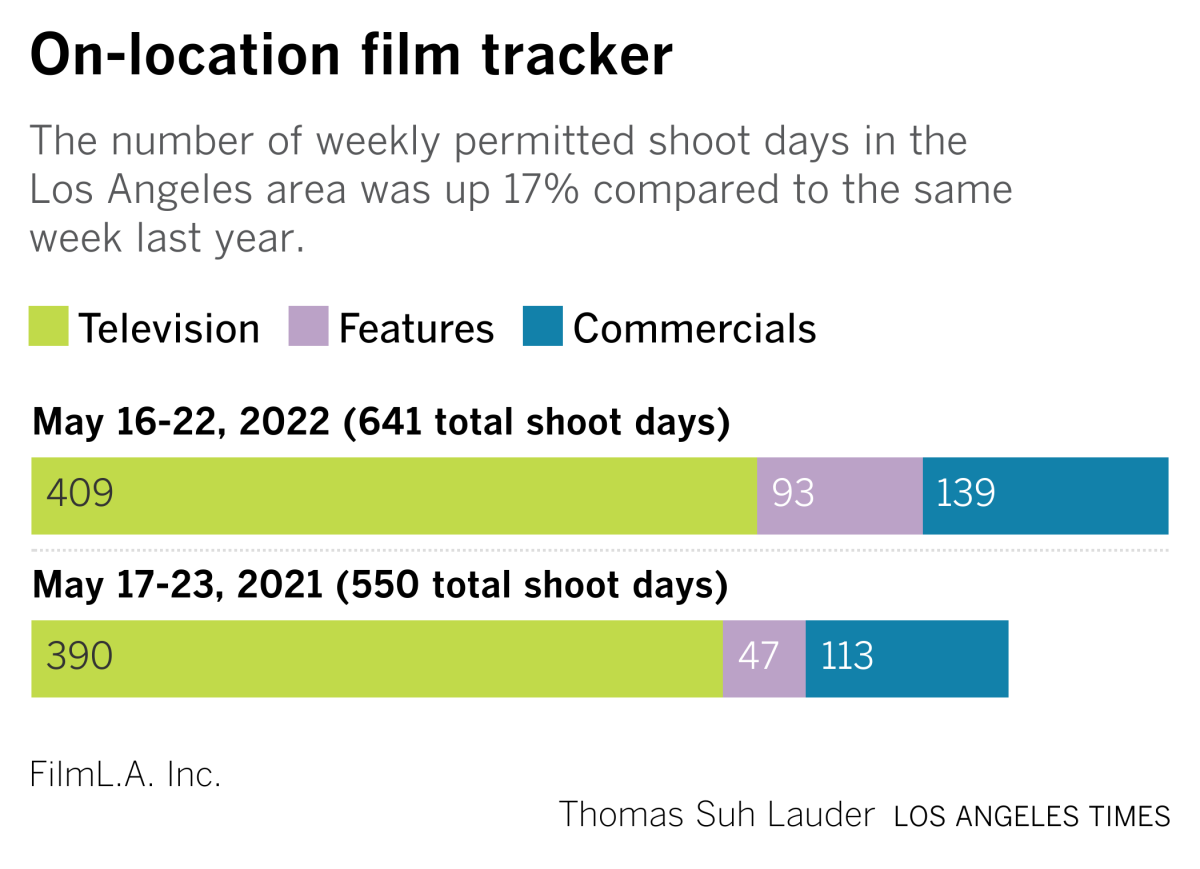Netflix’s layoffs are just the beginning of streaming’s correction

- Share via
This is the May 24, 2022, edition of the Wide Shot newsletter about the business of entertainment. If this was forwarded to you, sign up here to get it in your inbox.
When Netflix sneezes, the rest of Hollywood has a heart attack.
That was true during the free-spending era of the streaming wars, and it remains the case as the video giant enters its new, more frugal phase.
Netflix last week cut 150 full-time jobs in reaction to slowing revenue growth and its loss of 200,000 subscribers in the most recent quarter, the company’s first membership decline in more than a decade.
The firm also cut an unspecified number of contractors, many of whom worked on social media accounts that promote shows highlighting the LGBTQ community, women and people of color. Additional cuts resulted from the decision to kill animated series that didn’t fit Netflix’s shifting creative aims.
Is streaming’s Gilded Age coming to an end? If so, the market correction is not going to be a forgiving one for workers.
It’s not just Netflix, where more layoffs are expected. Warner Bros. Discovery Chief Executive David Zaslav quickly binned CNN+ less than a month after its launch and is looking for $3 billion in cost cuts from its recent merger. “Zas,” as the boss of the newly combined company is known, has told investors he’s not interested in winning the “spending wars.”
Some of this is just old-fashioned corporate consolidation, but it’s becoming clear, from talking to agents and producers, that there’s a broader pullback on content spending.
Wall Street cheered as legacy media companies tried to out-Netflix Netflix in the race to burn cash on content. Rising stock prices justified the spending sprees. Now, an economic recession looks increasingly likely, and stocks are falling. The cloud cover has burned off. Look at the numbers:
- Netflix: down 70% so far this year.
- Walt Disney Co.: dropped 32% since January.
- Warner Bros. Discovery: down about 25% after its April debut.
The cuts at Netflix may seem sudden, but the truth is that pressures on the company have been evident for some time. Its subscriber increases were slowing after the early pandemic surge despite supersized spending ($18 billion in content costs are expected this year) and some pretty big hits, like “Squid Game.” Netflix is hoping for a boost when the first chunk of “Stranger Things” Season 4 hits the service this week.
This made investors worry that some of their fundamental assumptions about the streaming business model were off. Maybe the total market isn’t big enough to support all this spending. The audience is shifting from linear TV to streaming, but it’s hard to actually make money there.
One thing to watch is how this contraction becomes a sorting mechanism for what companies really care about. During the good times, it’s easy enough to make splashy deals with creators and hire people to promote diverse storytelling on Twitter. During periods of stress, those initiatives are the first to suffer. Tudum, the Netflix promotional publication, laid off writers last month, many of whom had only recently come aboard.
Netflix also mothballed upcoming animated shows, including “Wings of Fire,” executive produced by Ava DuVernay, and “Antiracist Baby,” based on the book by scholar Ibram X. Kendi. Sources told Variety that these cuts were based on creative decisions rather than budgetary demands. Netflix has been open about wanting its programming to have broad appeal. That may mean less niche, creator-driven or socially activist material.
Here’s the balancing act. The company wants to control costs in response to its revenue slowdown. It also needs bigger hits to draw in subscribers amid increasing competition. Netflix needs to find ways to pump the brakes and step on the gas at the same time.
Long read of the week

“A child star at 7, in prison at 22. Then she vanished. What happened to Lora Lee Michel?” That’s the headline of Stacy Perman’s deeply reported story that reconstructs the life of the actress who, at age 7, was billed as a “sensation” with “the greatest appeal since Shirley Temple.”
More stuff we wrote
— How Ellen DeGeneres won, and then lost, a generation of viewers. Matt Brennan analyzes the strange career trajectory of one of daytime TV’s biggest stars.
— Going nowhere fast. New California gun safety bills for movie sets, after the deadly “Rust” shooting, have been hobbled in the state Legislature, Anousha Sakoui reports.
— Sound of silence. NBCUniversal staffers are raising concerns about their company’s political action committee supporting politicians who advance anti-LGBTQIA+ causes, Wendy Lee scooped. After what happened at Disney, the Comcast-owned company is keeping quiet.
— Headlines: From ‘Beavis and Butt-Head’ to ‘Yellowstone,’ MTV Entertainment bets on scripted shows. Chris Wallace’s interview show will move to Sunday nights on CNN and HBO Max. Fights over contract, long hours divide cinematographers’ union.
Number of the week

An interesting story in the Washington Post explains how subsidiaries and companies partly owned by publicly traded concert giant Live Nation received $19 million in federal “Save Our Stages” aid that was meant to support small venues during the pandemic.
Runner up: 53%
The streaming warriors are embracing advertising, and Madison Avenue is paying attention.
As Stephen Battaglio and Wendy Lee wrote during the Upfronts, viewers exhausted from so many subscription services are increasingly gravitating toward free streaming options like Paramount Global’s Pluto TV, Fox Corp.’s Tubi and Amazon’s Freevee, formerly known as IMDb TV.
From their story: “Research firm eMarketer projects Pluto TV’s domestic ad revenues to grow by 53% this year to $1.24 billion. Tubi is expected to grow by 79% to $883 million. Both are on track to increase at a faster rate than the established leaders in the ad-supported video streaming market, Hulu ($3.8 billion), YouTube ($3.06 billion) and San Jose-based Roku ($2.25 billion).”
Many consumers are willing to watch ads to save money. Hulu has an ad-supported version that’s cheaper than its commercial-free tier, as do Paramount+, Peacock and HBO Max. Netflix and Disney will have them soon too.
I just switched to the ad-supported version of HBO Max to try it out and save a little coin. It was a bit jarring at first to see “Hacks” interrupted with commercials, but I could see people getting adjusted to it.
Hollywood production
Here are this week’s charts showing weekly production shoot day data, according to FilmLA.


You should be reading...
— Mary McNamara on the never-ending Johnny Depp-Amber Heard trial. (Los Angeles Times)
— Natalie Shure on why the defamation trial doesn’t actually have to have a larger meaning. (The New Republic)
— Nicole Sperling on Tom Cruise, Hollywood’s last true movie star. (New York Times)
— Jesse David Fox on how the stand-up comedy special became an art form. (Vulture)
Finally...
I’ve been reading “American Prometheus: The Triumph and Tragedy of J. Robert Oppenheimer,” which Christopher Nolan is adapting into a film for Universal Pictures. There’s an extraordinary passage about halfway through in which the great Danish physicist Niels Bohr begins to raise concerns during the Manhattan Project about the long-term ramifications of introducing atomic weapons to the world.
Bohr’s 1950 open letter to the United Nations makes for fascinating reading, especially because of its call for an “open world” of exchanging scientific knowledge to solve an intractable problem. His dream may have been an impossible ideal, given the geopolitical context, but it’s a powerful message to ponder now as the world faces the same challenges, as well as new ones.
Inside the business of entertainment
The Wide Shot brings you news, analysis and insights on everything from streaming wars to production — and what it all means for the future.
You may occasionally receive promotional content from the Los Angeles Times.




